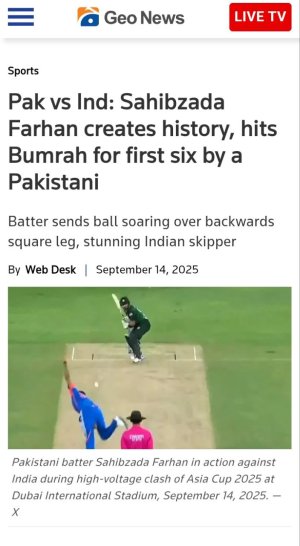- Joined
- Aug 12, 2023
- Runs
- 24,314
Mike Hesson in a post match press conference:
Q: Why didn't the teams shake hands at the end of the match, and why did Pakistan not send anyone to the post-match presentation?
Hesson: We were ready to shake hands, but the opposition had already gone into the changing room. We were disappointed by that. The decision to not send anyone to the post-match presentation was a "flow-on effect" of that initial incident.
Q: Your openers, Farhan and Sam, have been out of form. Why are you persisting with them? Do you have any better options?
Hesson: Both of them had been averaging 40 up until the last few matches and have performed particularly well for us. While we have lost a little momentum, I have full confidence in them to quickly turn their form around.
Q: Why was Haris Rauf not playing? Is he fit?
Hesson: Yes, he is certainly fit. The decision was based on the pitch. It was a spin-friendly wicket, and both sides' seamers bowled very few overs. We didn't need another seamer on this pitch.
Q: Why did you decide to bat first, especially since this ground has a history of favoring teams that chase?
Hesson: While there is a history of chasing teams winning, these used surfaces are slow and get slower. Runs on the board can be a big advantage. However, we didn't bat well enough. We were about 20 or 30 runs short, and we got squeezed in the middle overs.
Q: This loss exposes some of the team's inadequacies. Do you think this makes your job as a coach more difficult?
Hesson: Today, we were outplayed, and we can't hide from that. But we've performed very well with the bat recently. We may not have huge names, but we have quality players who "scrap really hard" and have over-performed in the majority of games we've played. We're not far off.
Q: Will you be making any changes for the next match?
Hesson: Our next game is on the 17th, and it's a must-win for us. We need to play better than we did today. We need to be more disciplined with the bat and the ball, but I was pleased with the character we showed in the field. I'm confident in the group to come back stronger.
Q: Half of your squad was playing their first match against India. Was the loss due to nerves or pressure, or a difference in quality?
Hesson: I think our batting was a little "frenzied" at the start. The ball held in the surface as we expected, but we didn't respond well. We got squeezed in the middle overs, which built up a lot of pressure. I believe the more big games you play, the more trust you have in your own game.
Q: It looked like the Pakistan middle order was unable to pick the Indian spinners. Is this a worrying sign?
Hesson: I don't think it was an issue of picking the spinners. It's about what you do once you've picked them. The Indian bowlers built pressure with their accuracy and by bowling a lot of dot balls. This pressure played tricks with our minds, and we ended up playing big shots. It was a build-up of pressure, not an inability to pick the spinners.
Q: Why didn't the teams shake hands at the end of the match, and why did Pakistan not send anyone to the post-match presentation?
Hesson: We were ready to shake hands, but the opposition had already gone into the changing room. We were disappointed by that. The decision to not send anyone to the post-match presentation was a "flow-on effect" of that initial incident.
Q: Your openers, Farhan and Sam, have been out of form. Why are you persisting with them? Do you have any better options?
Hesson: Both of them had been averaging 40 up until the last few matches and have performed particularly well for us. While we have lost a little momentum, I have full confidence in them to quickly turn their form around.
Q: Why was Haris Rauf not playing? Is he fit?
Hesson: Yes, he is certainly fit. The decision was based on the pitch. It was a spin-friendly wicket, and both sides' seamers bowled very few overs. We didn't need another seamer on this pitch.
Q: Why did you decide to bat first, especially since this ground has a history of favoring teams that chase?
Hesson: While there is a history of chasing teams winning, these used surfaces are slow and get slower. Runs on the board can be a big advantage. However, we didn't bat well enough. We were about 20 or 30 runs short, and we got squeezed in the middle overs.
Q: This loss exposes some of the team's inadequacies. Do you think this makes your job as a coach more difficult?
Hesson: Today, we were outplayed, and we can't hide from that. But we've performed very well with the bat recently. We may not have huge names, but we have quality players who "scrap really hard" and have over-performed in the majority of games we've played. We're not far off.
Q: Will you be making any changes for the next match?
Hesson: Our next game is on the 17th, and it's a must-win for us. We need to play better than we did today. We need to be more disciplined with the bat and the ball, but I was pleased with the character we showed in the field. I'm confident in the group to come back stronger.
Q: Half of your squad was playing their first match against India. Was the loss due to nerves or pressure, or a difference in quality?
Hesson: I think our batting was a little "frenzied" at the start. The ball held in the surface as we expected, but we didn't respond well. We got squeezed in the middle overs, which built up a lot of pressure. I believe the more big games you play, the more trust you have in your own game.
Q: It looked like the Pakistan middle order was unable to pick the Indian spinners. Is this a worrying sign?
Hesson: I don't think it was an issue of picking the spinners. It's about what you do once you've picked them. The Indian bowlers built pressure with their accuracy and by bowling a lot of dot balls. This pressure played tricks with our minds, and we ended up playing big shots. It was a build-up of pressure, not an inability to pick the spinners.













